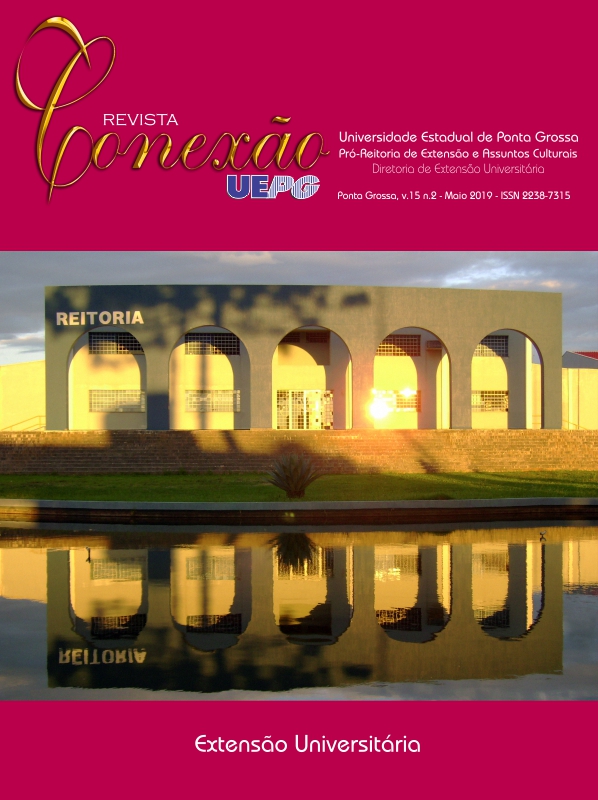A INCUBADORA TECNOLÓGICA DE COOPERATIVAS POPULARES DA UNIVERSIDADE DO PLANALTO CATARINENSE E A INCUBAÇÃO DA COOPERATIVA DE TRABALHO DOS CATADORES DE MATERIAIS RECICLÁVEIS DO MUNICÍPIO DE LAGES, SC
DOI:
https://doi.org/10.5212/Rev.Conexao.v.15.i2.0008Palavras-chave:
Catadores de Materiais Recicláveis, Cooperlages, Economia Solidária, Incubadora Tecnológica de Cooperativa Populares.Resumo
O objetivo deste texto é refletir sobre a Incubadora Tecnológica de Cooperativas Populares da Universidade do Planalto Catarinense (ITCP UNIPLAC) e o processo de incubação da Cooperativa de Trabalho de Catadores de Materiais Recicláveis do Município de Lages, SC (COOPERLAGES). Descreve-se o contexto de emergência do movimento social da economia solidária, a institucionalização da incubadora, enfatizando sua aproximação com o universo dos catadores por meio de ações de incubação da cooperativa e o enfrentamento de desafios na gestão interna e na coleta seletiva. Neste processo pedagógico, são destacadas a formação dos catadores, organização, constituição da cooperativa e assinatura do primeiro contrato de prestação de serviço da coleta seletiva de materiais recicláveis entre a cooperativa e a Prefeitura Municipal de Lages, para o período de março de 2015 a março de 2016. A reflexão evidencia o papel da Incubadora no processo de incubação da cooperativa, orientada por princípios e valores da economia solidária, ou seja, autogestão, propriedade coletiva dos meios de produção, cooperação, solidariedade, democracia, responsabilidade com o entorno social, cuidado com o meio ambiente, integrando consumo solidário com sustentabilidade. A pesquisa se caracteriza por uma abordagem qualitativa, bibliográfica, descritiva e explicativa. Trata-se de um estudo de caso, pois reflete sobre uma parte de uma totalidade maior de características similares. Os referenciais teóricos de análise trabalham com a temática da economia solidária, incubadora universitária e política pública de resíduos sólidos. O estudo demonstra que a COOPERLAGES se constitui numa organização relevante para seus cooperados, que passam de condições desumanas para condições mais humanas de vida; que o município de Lages exercita primeiros passos rumo à política nacional de resíduos sólidos, conforme preconiza a Lei 12.305/10; que conforme mostram as ações de incubação, nas gestões interna da cooperativa e da coleta seletiva, residem os maiores obstáculos a serem superados com a participação de todos os atores envolvidos: a prefeitura municipal, a comunidade, a cooperativa e a ITCP UNIPLAC, para que se efetive e se consolide a política pública de resíduos sólidos no município de Lages; finalmente, que a universidade tem a oportunidade de fortalecer o ensino, a pesquisa e a extensão socialmente relevante.
Downloads
Referências
ADAMS, Telmo; MORETTI, Cheron Zanini. Pesquisa Participativa e Educação Popular: epistemologias do sul. Educação & Realidade, v. 36, n. 2, p. 327-632, maio/ago. 2011.
MELO, Alex; ALMEIDA-FILHO, Naomar; RIBEIRO, Renato Janine. Por uma Universidade Socialmente Relevante. Portal do MEC, 2009.
ARCANJO, M. A. S.; OLIVEIRA, A. L. M. A criação da Secretaria Nacional de Economia Solidária: Avanços e Retrocessos. Perseu: História, Memória e Política, v. 13, p. 231, 2017.
VARANDA, Ana Paula de Moura; BOCAYUVA, Cunca (Orgs.). Tecnologia Social, Economia Solidaria e políticas Públicas. FASE, IPPUR, LASTRO, Brasil, 2009.
BRASIL. Lei nº 12.305 de 2 de agosto de 2010. Institui a Política Nacional de Resíduos Sólidos. Presidência da República Casa Civil. Subchefia para Assuntos Jurídicos.
Disponível em: <http://www.planalto.gov.br/ccivil_03/_ato2007-2010/2010/lei/l12305.htm>. Acesso em: 14 ago. 2018.
CISAMA. Consórcio Intermunicipal – Serra Catarinense. Disponível em: http://www.cisama.sc.gov.br/. Acesso em: 14 ago. 2018.
GIL, Antonio Carlos. Como elaborar projetos de pesquisa. 5. ed. São Paulo: Atlas, 2008.
MARX, K.; ENGELS, F. A ideologia alemã. São Paulo: Hucitec.1986.
SCARIOT, Nádia. A socialização Profissional de Catadores de materiais Recicláveis e a Constituição de Saberes Profissionais e Emancipatórios. Dissertação (Mestrado em Educação nas Ciências) - UNIJUI, Ijuí, 2017.
TRIVINOS, Augusto Nibaldo Silva. Introdução à pesquisa em ciências sociais: a pesquisa qualitativa em educação. São Paulo, Atlas, 2013.
UNIPLAC. Plano de Desenvolvimento Institucional. PDI. 2010-2018. Disponível em: www.uniplaclages.edu.br. Acesso em: 14 ago. 2018.
Downloads
Publicado
Edição
Seção
Licença
a) Os autores mantêm os direitos autorais e concedem à revista o direito de primeira publicação, com o trabalho simultaneamente licenciado sob a Creative Commons Attribution License que permite o compartilhamento do trabalho com reconhecimento da sua autoria e publicação inicial nesta revista.
b) Ao submeter um artigo à Revista Conexão UEPG e tê-lo aprovado os autores concordam em ceder, sem remuneração, os seguintes direitos à Revista: os direitos de primeira publicação e a permissão para que a Revista redistribua esse artigo e seus metadados aos serviços de indexação e referência que seus editores julguem apropriados.
c) Os leitores são livres para transferir, imprimir e utilizar os artigos publicados na Revista, desde que haja sempre menção explícita ao(s) autor (es) e à Revista Conexão UEPG e que não haja qualquer alteração no trabalho original. Qualquer outro uso dos textos precisa ser aprovado pelo(s) autor (es) e pela Revista.

Este obra está licenciado com uma Licença Creative Commons Atribuição 4.0 Internacional.





